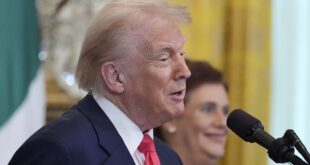Global mining stocks have declined as metal prices fell, driven by a strong US dollar and disappointing details from China’s latest stimulus measures.
Global mining stocks suffered as metal prices slumped, driven by a robust US dollar and disappointment over China’s recent stimulus measures.
Major European mining stocks declined sharply this week following Donald Trump’s victory in the US presidential election. The dollar’s surge exerted downward pressure on both precious and industrial metal prices, including gold, silver, and copper, which are core products for large mining firms.
Shares of Rio Tinto, Anglo-American, and Glencore all fell between 5% and 7% from last week, with the mining sector becoming the worst performer in European stock markets. The Pan-European Stoxx 600 index fell by 2%, with the Basic Resources Index leading losses, down 3.72% on Tuesday.
China move disappoints investors
While the “Trump trade” continued to weigh on European markets, China’s recent stimulus briefing further disappointed investors by lacking specific details. China’s economic outlook heavily influences industrial metal and critical mineral prices, particularly copper and iron ore, which have seen sharp declines over the past few trading days.
Key upcoming economic data releases, including the US monthly Consumer Price Index (CPI) later today and China’s industrial production figures on Friday, are expected to serve as near-term price drivers for these commodities, setting the tone for mining stock trends for the rest of the week.
Gold and silver plunge following Trump’s election win
Precious metals such as gold and silver have seen significant price declines since last week. Gold futures contracts on COMEX dropped approximately $105 (€99) per ounce to just above $2,600 (€2,449), marking a 5% decline since Election Day, while silver futures slid by $2 (€1.9) per ounce, or 6%, over the same period.
Market participants expect Trump’s policies, including tariffs, to increase US inflation, prompting the Federal Reserve (Fed) to raise interest rates once again. This expectation has fuelled a rally in the dollar. US government 10-year bond yields also rose to their highest levels in more than four months, as bond traders anticipate a more resilient US economy and higher interest rates.
A stronger dollar and rising bond yields have made gold and silver less appealing to investors, particularly within the US’s buoyant, risk-on stock market.
Wall Street has repeatedly hit record highs this year, despite a sharp retreat on Tuesday.
Michael Brown, a senior research strategist at Pepperstone in London, noted: “Amid cleaner post-election positioning, the recipe for broad-based equity gains into year-end seems a potent one.” The downside momentum in gold may well continue.
He added: “A break below $2,600/oz could now precipitate further selling pressure.”
Copper and iron ore prices slide as China’s stimulus briefing falls short
Copper and iron ore prices have slumped over the last three trading days after China unveiled a 10 trillion yuan (€1.3 trillion) package last Friday aimed at easing local governments’ financing constraints.
However, the measures lacked provisions for a direct cash injection into the economy, disappointing investors who were anticipating more decisive policies to bolster domestic demand and counter the potential impacts of Trum’’s tariffs. Officials suggested that more substantial fiscal policies would be announced next year.
The price of copper futures dropped by 3.5% last Friday, while iron ore futures on China’s SGX fell by 3.3%, ending just above $102 (€96) per metric ton. This marks the lowest level since 30 August and is close to the psychologically significant level of $100 (€94). China, as the world’s largest importer of copper and iron ore, has seen its demand affected by the ongoing property crisis, which continues to impact the steel sector and related industries in the world’s second-largest economy.
The risks associated with Trump’s trade tariffs and potential friction between China and other nations may further dampen commodity markets, particularly for industrial commodities.
Kyle Rodda, a senior market analyst at Compital.com, remarked: “The impact of tariffs on China is twofold. Firstly, it will slow China’s growth and thereby reduce demand for commodities.
“Secondly, the Chinese Yuan will likely depreciate further to ‘offset’ the tariff impacts, which would in turn weaken China’s purchasing power.”
 topnaijanews Stay informed with the latest Nigerian news at your fingertips
topnaijanews Stay informed with the latest Nigerian news at your fingertips
